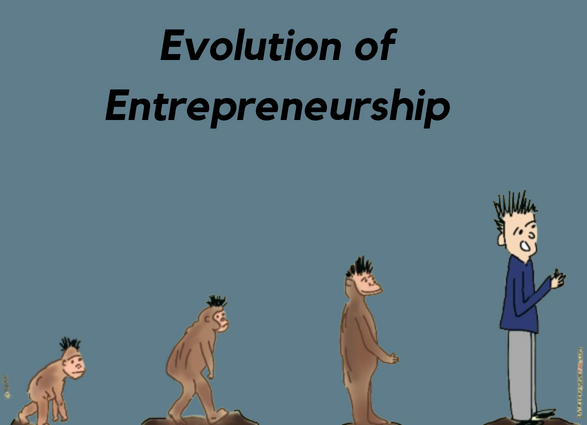Societal and technological changes have substantially impacted the entrepreneurial sector. Regardless of the business size, entrepreneurial spirit has always played a role. Because online shopping connected them to consumers worldwide, companies had to adjust their operations significantly. More and more chances to work on personal projects have opened up thanks to the “gig economy” and independent contractors.
The mobile app development sector is a perfect example of how limitless modern enterprises are when it comes to innovation. This essay will explore entrepreneurship’s intriguing past, present, and future. Here, we will talk about evolution of entrepreneurship in detail.
Contents
The home-based business: a legacy of entrepreneurship
The pioneers could save money and time by founding their companies from the comfort of their own homes. The emergence of home-based businesses has been revolutionized by technological advancements, providing entrepreneurs with unmatched access to a worldwide market.
Previously unimaginable, even mom-and-pop stores can now compete globally and draw customers worldwide thanks to online marketplaces. Modern businesses, in contrast to their brick-and-mortar rivals, may more readily take advantage of the many opportunities for expansion and growth presented by the Internet.
Modern advancements in communication networks have greatly simplified acquiring resources, promoting products, and cooperating amongst geographically scattered organizations.
Many entrepreneurs embrace autonomy and adaptability when they run their companies out of their homes. Due to their control over their schedules and the ability to work from anywhere, entrepreneurs can achieve a pretty good work-life balance. Those with families or attempting to strike a better work-life balance might value this adaptability.
Many famous companies had humble beginnings as mom-and-pop stores; Apple and Google are only two examples. These firms provide examples of the many options accessible to people wanting to work remotely, encouraging many to start their businesses.
Launching a home-based business in the Internet era has never been more convenient or lucrative. Internet successful entrepreneurs started and grew their businesses from the comfort of their homes; all it takes is access to the correct information and tools.
Brick-and-mortar stores: the traditional marketplace
The Rock-Solid Basis of Traditional Storefronts: Trade
“Brick and mortar stores,” the old-fashioned retail outlets, have endured for a long time. Customers may physically interact in these genuine spaces, which promotes trust through familiarity and direct communication. They guarantee on-time delivery of goods and services thanks to their dependable supply chains and distribution networks, which have helped them become a retail staple.
The drawbacks of traditional stores are not insignificant, though. Their capacity to scale, crucial to their success, is improved, and their potential audience needs to be expanded. Further limiting their potential and making expanding their customer base tougher are geographical limitations. They may also see a drop in profitability due to higher expenditures on fixed expenses like rent, utilities, and staff compensation.
Still, the retail ecology would be severely lacking without traditional brick-and-mortar stores. They provide customers with an exciting shopping experience that hits home for them on multiple levels. Many shoppers still place a premium on touching and feeling products, receiving personalized assistance, and chatting with salespeople.
The tactile experience of visiting a physical store is unmatched by anything for customers hoping to build a deeper bond with the products they purchase.
Many businesses have come to recognize the many benefits of having brick-and-mortar locations. Thus, many have adopted a hybrid strategy combining online and offline operations. Omnichannel strategies are more effective at catering to modern consumers’ diverse demands because they combine the best features of the two models.
Businesses have a better chance of increasing client happiness and growing their customer base if they expertly combine the ease of Internet shopping with the thrill of in-store encounters.
E-commerce: a digital revolution
Eliminating brick-and-mortar establishments due to online shopping has completely changed the retail industry. Consumers ‘ habits are changing because of how easy it is to shop online. With the rise of online shopping, would-be entrepreneurs may start their businesses with little money down.
Increases in the number of individuals with access to computers and smartphones, as well as advancements in mobile internet connectivity and the security of payment methods, have all contributed to the meteoric rise in the popularity of online shopping. The convenience of online purchasing has greatly benefited clients, contributing to the current boom in the e-commerce business, among other factors.
Many brick-and-mortar shops need help competing with the ease and low prices provided by online retailers due to the enormous impact of internet shopping on the retail sector. Conversely, e-commerce has given businesses more opportunities, like reaching customers worldwide and meeting their needs.
Our consumption patterns have changed significantly since the advent of internet shopping. As more and more people discover how convenient and varied online shopping is, its popularity is bound to soar.
Freelancing and the gig economy: flexibility and independence
As a result of freelancing and the gig economy, more people can pursue their passions while making ends meet. Many people work independently as independent contractors since many online markets and platforms connect customers with service providers. Working as a freelancer gives you much freedom, including setting your hours, rates, and location. As a consequence, their level of independence and responsibility at work increases.
Many people are drawn to freelancing because it allows them to be independent and adaptable. Very bright people, professionals aiming for financial security, and those seeking a better work-life balance are all in this category. Since the gig economy does not require the traditional wisdom about starting a corporation from the bottom up, it may encourage more people to attempt to become entrepreneurs.
The rise of contingent labor, including freelancing, has disrupted people’s daily lives and ability to plan for the future.
The absorption of freelancers into the global workforce is a direct result of their vital role in fostering innovation and expanding economies across the globe. Freelancing has given many people the independence and flexibility to make a difference.
Working as a freelancer or in the gig economy is sometimes a bed of roses. A few things you might anticipate are irregular hours, low pay, and lack of benefits. Being successful as an independent contractor requires a unique blend of financial knowledge, self-control, and innate ambition.
Given the longevity of gig economy jobs and freelancing, the need for more flexible work schedules is expected to continue in the years to come.
Evolution of Entrepreneurship: Mobile app development innovation in your pocket
By fundamentally changing how businesses function and engage with their clientele, the emergence of mobile app development has completely changed the entrepreneurial scene. Owners of companies who wish to capitalize on this massive and quickly growing market now require mobile apps due to the widespread usage of smartphones and tablets.
One of the main draws of making apps for mobile devices is the ease with which business owners can stay in touch with customers worldwide and connect with them regardless of their physical location. The lowered barriers to entry for reaching clients all over the globe in the last several decades have allowed entrepreneurs to expand their businesses faster.
Making mobile device apps is one of the best ways to reach more people and show off one’s creativity. Applications can disrupt entire markets by introducing novel approaches to old problems, enhancing user experiences, and decreasing expenses.
The potential applications are nearly limitless, ranging from wellness-promoting healthcare software to e-commerce systems that streamline online purchasing. Startups may adapt to customers’ ever-shifting needs by developing innovative mobile goods and services.
Starting to create apps for mobile devices doesn’t necessitate a ton of money or technical knowledge, which is the most excellent part. Thanks to the proliferation of user-friendly app development platforms and tools, entrepreneurs no longer need extensive technical expertise or a huge development team to bring their ideas to life.
A more creative and innovative atmosphere has grown as app production has become more accessible, and ambitious businesspeople find it simpler to turn their ideas into reality.
The versatility of creating mobile applications is a massive plus for company owners. The capacity to quickly adapt to changing customer tastes and market trends is crucial in the fast-paced world of modern business. Any company that wants to keep up with the times and satisfy its customers’ ever-changing demands should regularly update and improve its mobile apps.
The development of mobile applications is a field that offers company owners many alternatives. To thrive in the modern digital world, startups must be innovative, easy to use, scalable, and adaptable. Mobile app development can help entrepreneurs achieve these goals.











1 thought on “The Evolution of Entrepreneurship: From Home-Based Businesses to Mobile App Firms”